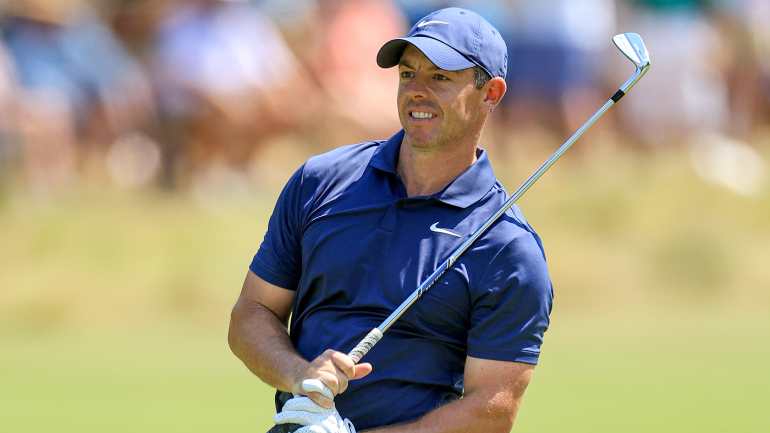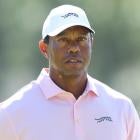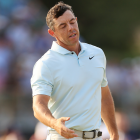
PINEHURST, N.C. -- Rory McIlroy has not won a major championship in a decade. It's been a long slog featuring numerous close calls, including two second-place finishes in the last two years alone. On Sunday, McIlroy will begin his final round at the 2024 U.S. Open with a chance to finally break through if he can convert a winning opportunity into a trophy-hoisting victory.
McIlroy has finished in the top-10 a whopping 20 times since his last major win, the 2014 PGA Championship at Valhalla. And while some of those finishes have come amid ultra-low Sunday rounds leading to backdoor finishes up the leaderboard, it's been Rory's proximity to the winner's circle in recent years that's made his major drought particularly frustrating.
Five of McIlroy's last 10 major starts have resulted in a finish of T6 or better, including a runner-up in last year's U.S. Open at Los Angeles Country Club. That most closely mirrors the situation that McIlroy will face on Sunday at Pinehurst No. 2. He'll be in the penultimate group like he was last year, and he'll be paired with another of the game's top talents in Patrick Cantlay after playing alongside Scottie Scheffler in 2023.
The goal will be the same: chase down the leader with a score that breaks par to put pressure on the final group as they work their way towards the clubhouse. McIlroy was not able to accomplish that last year, picking up a birdie on the first hole and a bogey on the 14th for an even par final round of 70 before falling to the eventual winner Wyndham Clark by one shot.
"Pros and cons to being in the last group, and maybe playing one group ahead mightn't necessarily be a bad thing," McIlroy said after his 1-under 69 on Saturday. "I'm pretty much in the same position that I was last year going into the final day at LACC. So, familiar position, been here many times before, and hopefully tomorrow I produce the golf that's needed to go one better."
While the 2011 U.S. Open marked McIlroy's first major victory -- lapping the field as a 22-year old at Congressional Country Club -- this particular major was not an event that fit his game for much of his early career. McIlroy missed the cut five times in nine starts at U.S. Opens from 2010-18, and he' expressed this week the sentiment that he didn't have the right approach to attacking the unique challenge presented by the USGA for its national championship.
A change in mentality -- one that embraces the challenge and is willing to take a more conservative approach when needed -- has led to much different results. McIlroy has finished in the top 10 in each of his last five U.S. Open starts, and he credits his change in approach.
"I really don't think I embraced U.S. Open setups probably 10 years into my U.S. Open career," he admitted earlier in the week. "Played my first one in 2009, and I think I really changed my mindset around them in 2019, that one in Pebble, and then since then I've -- I've also started to enjoy this style of golf a lot more. It's a lot different than the golf that we play week in, week out."
That style of golf? It's about showing humility to the course, playing conservatively at times but aggressively when you have an opportunity. And most importantly, it's about knowing how to handle adversity when you suffer a setback, trying to hit the middle of greens, giving yourself a chance every single hole but "taking your medicine if you do hit it into trouble."
Even within his effort so far here at Pinehurst, there is a lesson to be drawn and places to improve on his closing. Two late bogeys (on No. 15 and No. 17) kept McIlroy out of the final pairing with Bryson DeChambeau and prevented him from being within one shot of the lead rather than holding the three-shot deficit he faces coming into Sunday.
Flipping the results of these close calls and snapping a decade-long major drought is going to come down to better a finish, coming up with the shots needed when the championship is on the line late Sunday. If McIlroy can summon that excellence under pressure, he will place the final piece of the puzzle that has been his inability to capture the elusive fifth major.





















